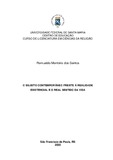| dc.contributor.advisor | Marquezan, Lorena Ines Peterini | |
| dc.creator | Santos, Romualdo Monteiro dos | |
| dc.date.accessioned | 2021-03-05T16:59:43Z | |
| dc.date.available | 2021-03-05T16:59:43Z | |
| dc.date.issued | 2020-12-15 | |
| dc.date.submitted | 2020 | |
| dc.identifier.uri | http://repositorio.ufsm.br/handle/1/20390 | |
| dc.description | Trabalho de conclusão de curso (graduação) - Universidade Federal de Santa Maria, Centro de Educação, RS, 2021 | por |
| dc.description.abstract | This Course Conclusion Paper (TCC) of the Religious Sciences course, mobilizes many questions from the author, on the issue of the contemporary subject. Understanding such a subject has been a quest that still begins in Ancient Greece, in particular, with Socrates embracing, minting and living, based on what he experienced, in the temple at Delphi, the sense of existence engraved in the phrase contained in the stone: “Know yourself”. This thinker discovers the inner man, precisely at a time when all efforts were centered on the search for an understanding and understanding of the origin of phisis. As a general objective we seek to understand the contemporary subject in the face of existential reality and the real meaning of life. As a specific objective to deepen the knowledge about the meaning of life from the theoretical assumptions from the hermeneutic philosophy. As a problem, we question how the subject sees himself in the face of existential reality and what kind of meaning does he attribute to his life? Second Víktor Frankl, the meaning of life changes, however, without ceasing to exist and, in order to seek the discovery of this meaning, there are three ways: a) do a job or in the practice of an act; b) experiencing something or meeting someone; c) the posture taken in the face of suffering. If in the first it is something simple, in the second, the meaning of life requires kindness, truth, beauty; but it will also demand the need for experience with the other, in a meeting in his originality - loving him. | eng |
| dc.language | por | por |
| dc.publisher | Universidade Federal de Santa Maria | por |
| dc.rights | Acesso Aberto | por |
| dc.rights | Attribution-NonCommercial-NoDerivatives 4.0 International | * |
| dc.rights.uri | http://creativecommons.org/licenses/by-nc-nd/4.0/ | * |
| dc.subject | Sentido da vida | por |
| dc.subject | Meaning of life | eng |
| dc.subject | Vazio existencial | por |
| dc.subject | Projeto de vida | por |
| dc.subject | Sujeito contemporâneo | por |
| dc.subject | Existential void | eng |
| dc.subject | Contemporary subject | eng |
| dc.title | O sujeito contemporâneo frente à realidade existencial e o real sentido da vida | por |
| dc.type | Trabalho de Conclusão de Curso de Graduação | por |
| dc.degree.local | Polo de São Francisco de Paula, RS, Brasil | por |
| dc.degree.graduation | Ciências da Religião | por |
| dc.description.resumo | Este Trabalho de Conclusão de Curso (TCC) do curso de Ciências da Religião, mobiliza muitos questionamentos do autor, sobre a questão do sujeito contemporâneo. Entender tal sujeito tem sido uma busca que inicia ainda na Grécia Antiga, em especial, com Sócrates ao abraçar, cunhar e viver, a partir daquilo que ele experienciou, no templo de Delfos, o sentido de existência gravada na frase contida na pedra: “Conhece-te a ti mesmo”. Este pensador descobre o homem interior, justamente num período em que todos os esforços se centralizavam na busca de um entendimento e compreensão da origem da phisis. Como objetivo geral buscamos entender o sujeito contemporâneo frente à realidade existencial e o real sentido da vida. Como objetivo especifico aprofundar os conhecimentos sobre o sentido da vida a partir dos pressupostos teóricos a partir da filosofia hermenêutica. Como problema, questionamos como o sujeito se vê frente à realidade existencial e que tipo de sentido ele atribui à sua vida? Segundo Víktor Frankl, o sentido da vida se modifica, no entanto, sem deixar de existir e, para buscar a descoberta desse sentido há três maneiras: a) fazer um trabalho ou na prática de um ato; b) experimentando algo ou encontrando alguém; c) pela postura tomada frente ao sofrimento. Se na primeira é algo simples, na segunda, o sentido da vida requer benignidade, verdade, beleza; mas exigirá também a necessidade de experiência com o outro, num encontro em sua originalidade – amando-o. | por |
| dc.publisher.country | Brasil | por |
| dc.publisher.initials | UFSM | por |
| dc.subject.cnpq | CNPQ::CIENCIAS HUMANAS::TEOLOGIA | por |
| dc.publisher.unidade | Centro de Educação | por |



